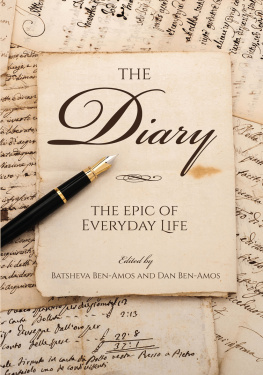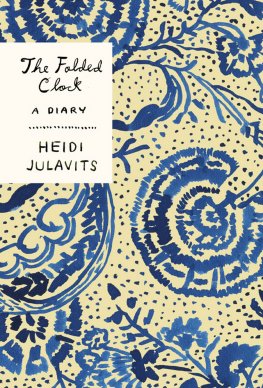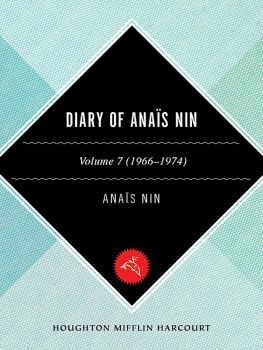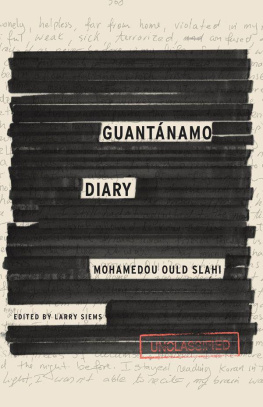Table of Contents
Guide
The Diary
THE DIARY
The Epic of Everyday Life
EDITED BY
BATSHEVA BEN-AMOS AND
DAN BEN-AMOS
INDIANA UNIVERSITY PRESS
This book is a publication of
Indiana University Press
Office of Scholarly Publishing
Herman B Wells Library 350
1320 East 10th Street
Bloomington, Indiana 47405 USA
iupress.indiana.edu
2020 by Batsheva Ben-Amos and Dan Ben-Amos
Excerpt(s) from THE DIARY OF ANNE FRANK: THE REVISED CRITICAL EDITION by Netherlands Institute for War Document, translation copyright 2003 by Doubleday, a division of Penguin Random House LLC. Used by permission of Doubleday, an imprint of the Knopf Doubleday Publishing Group, a division of Penguin Random House LLC. All rights reserved.
730 words from THE DIARY OF ANNE FRANK, THE REVISED CRITICAL EDITION by Anne Frank, edited by Otto H. Frank and Mirjam Pressler, translated by Susan Massotty (Viking, 2003) copyright The Anne Frank-Fonds, Basle, Switzerland, 1991. English translation copyright Doubleday a division of Bantam Doubleday Dell Publishing Group Inc., 1995.
All rights reserved
No part of this book may be reproduced or utilized in any form or by any means, electronic or mechanical, including photocopying and recording, or by any information storage and retrieval system, without permission in writing from the publisher. The paper used in this publication meets the minimum requirements of the American National Standard for Information SciencesPermanence of Paper for Printed Library Materials, ANSI Z39.48-1992.
Manufactured in the United States of America
Library of Congress Cataloging-in-Publication Data
Names: Ben-Amos, Batsheva, editor. | Ben-Amos, Dan, editor.
Title: The diary : the epic of everyday life / edited by Batsheva Ben-Amos and Dan Ben-Amos ;
Description: Revised edition. | Bloomington, Indiana : Indiana University Press, 2020. | Includes bibliographical references and index.
Identifiers: LCCN 2019055943 (print) | LCCN 2019055944 (ebook) | ISBN 9780253046987 (hardback) | ISBN 9780253046994 (paperback) | ISBN 9780253046963 (ebook)
Subjects: LCSH: DiariesHistory and criticism. | AuthorsBiographyHistory and criticism. | Literature, Modern20th centuryHistory and criticism. | Literature, Modern19th centuryHistory and criticism.
Classification: LCC PN4390 .D485 2020 (print) | LCC PN4390 (ebook) | DDC 809/.983dc23
LC record available at https://lccn.loc.gov/2019055943
LC ebook record available at https://lccn.loc.gov/2019055944
12345252423222120
CONTENTS
This volume was consolidated through many years of teaching and research on the diary at the University of Pennsylvania in the Departments of History, English, Comparative Literature, and the College of Liberal and Professional Studies. Batsheva Ben-Amos realized there was a necessity for a volume such as this in the rich and growing field of diary scholarship, from her contact with students and other scholars. We are grateful to all the authors who entrusted us with their most valuable essays that contribute to the breadth and depth of this volume and demonstrate the significance of the diary and its study to research in the humanities and social studies.
We thank Philippe Lejeune, who offered valuable support and suggestions. And we thank Suzanne L. Bunkers, who helped with advice at the initial stages of the volumes preparation. Dagmara Meijers-Troller translated three French articles into English. Sadly, we learned of her passing in 2018. Thanks go to Janice Meyerson for her editorial assistance. Special thanks go to the archivists of the United States Holocaust Memorial MuseumRonald Coleman, Vincent Slatt, and Megan Lewisfor the tireless help they provided Batsheva Ben-Amos in her research on the Holocaust diaries. Very valuable was the technical assistance of our son Itamar Ben-Amos, who helped us navigate the maze of the digital world. The critical comments of the anonymous peer reviewers helped us shape the submitted manuscript into the current volume. Finally, we would like to note our gratitude to Janice E. Frisch from Indiana University Press, who accompanied the transformation of this anthology of essays from manuscript into a published volume with wise, insightful, and perceptive guidance.
The Diary
ON JANUARY 4, 2018, THE New York Times reported the discovery of a diary written in the Soviet gulag in Siberia in 194142. The palm-size 115-page diary lay in obscurity for nearly seventy years. It belonged to Olga M. Ranitskaya, a camp weather station worker. She combined whimsical drawings with rhyming couplets, portraying the physical and emotional hardships of a spirited stick figure, her alter ego. In writing her diary, Ms. Ranitskaya risked her life: anyone caught pen in hand was summarily executed in the Soviet gulag.
Individuals have put their lives into words for many different reasons. But the forces that compel these individuals to script their daily life and write down their personal acts and emotions are irresistible and even lead some diarists to disregard any danger. Under the cover of the mundane, they record internal and external changes and conflicts in their own lives and in their societies, protecting these moments from the destructive vagaries of memory. These recorded moments could be periods of transition (such as into adolescence), change in relationships, relocation for pleasure or under pressure, illness, oppression or duress in combat, and captivity or exhilarating freedom. For many the compulsion to write is uncontrollable, and often the writing itself breaks literary and social conventions or, as in the case of Olga M. Ranitskaya, risks the diarists own life.
Diary discovery and analysis are part of an interdisciplinary field of research. New diaries, as well as critical studies of earlier texts, frequently appear in print, and in the past fifty years, diary studies have come into their own. Scholarship has honed critical concepts, standards, and theories. Diarists have responded to modern technologies, posting intimate entries on the internet, and archived diaries are now available online. Theories and technologies have revitalized diary research.
The goal of this volume is to bring together some of the best of this research and offer an account of the form in its social, historical, and cultural-literary contexts with its own distinctive features, poetics, and rhetoric. Our purpose is to synthesize decades of interdisciplinary study in order to further future research on the diary as both a literary form and a medium of historical documentation. Our orientation is global, aiming to address fundamental diary categories and theoretical and methodological issues that recent diary research has consolidated.
The Diary as a Genre
In any cultural or literary tradition, the diary stands out as a unique narrative genre, linguistically designated with its own term. In English, we use the term diary; the modern Chinese use riji; the French, journal intime; and the Germans, Tagebuch. It is diario in Italian, Portuguese, and Spanish and nikki in Japanese. The diary is an ethnic genre, empirical and cultural, rather than an analytical category. Diary writing records time as a human experience; an entrys length and brevity depend on emotions, not nature, fusing past memories with future expectations. Yet diary writing is done in the objective temporal segments of days, which gives the form its name, creating a situation in which subjectivity bursts through the seams of objectivity.
For the diary, the imprint of its making is on its final form, and in this, the diary genre has no rival in the arts. By this we mean that the everyday reality of its narrative interacts with its narrating practice. The very process of writing a diary shapes the diary text, making it both an art and an act. In contrast to literary authors, who present their works to their readers, hiding, destroying, or archiving any revisions, corrections, or changes they make in drafts or galley proofs, the diarists retain all of them, preserving the fragmentary process, the continuity and discontinuity that is involved in writing a diary. Elizabeth Podnieks reiterates this observation in her more detailed description of the diary as
Next page







